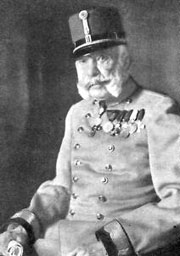EMPEROR FRANZ JOSEF I 1830-1916

Franz Josef, emperor of Austria and king of Hungary, liked to present himself as a 'European monarch of the old school'. As he had been on the throne for 66 years in 1914, it is difficult to repudiate such a claim.Austria-Hungary experienced a long period of decline under Franz Josef. It was militarily defeated by France shortly after he ascended the throne in 1848, and the rise of Italy challenged Austrian power in the south.
The unification of Germany under Bismarck meant that Austria could no longer be regarded as the leading Germanic power.Austria's reluctance to assist Russia during the Crimean War led to a deterioration in relations between the two states.
In 1879, Germany and Austria-Hungary formed a Dual Alliance to provide mutual protection against attack by Russia or France. This was expanded into the when Italy joined in 1882.By the mid-19th century, Hungary had started to demand more political autonomy, and so, in 1867, Franz Josef agreed to the establishment of a 'dual monarchy', which gave Hungary greater control over domestic matters.
However, his plans to give greater self-government to Slavs within the empire were thwarted, and Austria-Hungary's annexation of Bosnia in 1908 created considerable friction with Serbia.Franz Josef was 84 when the war started, and military strategy was largely decided by his generals. He continued to enjoy great personal popularity up to the time of his death in 1916, when he was succeeded by his grand-nephew.

0 Comments:
Post a Comment
<< Home